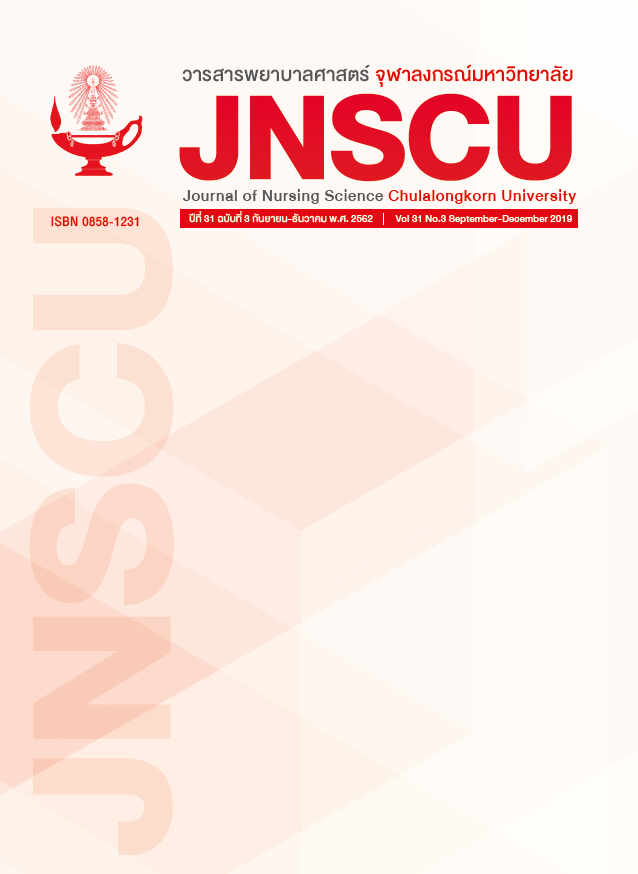ผลของโปรแกรมเสริมสร้างพลังอำนาจต่อการฟื้นสภาพหลังผ่าตัดระยะท้ายในผู้ป่วยที่ได้รับการผ่าตัดกระดูกสันหลังระดับเอว
คำสำคัญ:
ผู้ป่วยผ่าตัดกระดูกสันหลังระดับเอว, การฟื้นสภาพหลังผ่าตัด, การเสริมสร้างพลังอำนาจบทคัดย่อ
บทคัดย่อ
วัตถุประสงค์: เพื่อศึกษาผลของโปรแกรมเสริมสร้างพลังอำนาจต่อการฟื้นสภาพหลังผ่าตัดระยะท้ายในผู้ป่วยที่ได้รับการผ่าตัดกระดูกสันหลังระดับเอว
รูปแบบการวิจัย: การวิจัยกึ่งทดลอง
วิธีดำเนินการวิจัย: กลุ่มตัวอย่าง คือ ผู้ป่วยผ่าตัดกระดูกสันหลังระดับเอว อายุ 30-59 ปี ที่พักรักษาตัวในหอผู้ป่วยศัลยกรรมประสาท สถาบันประสาทวิทยา จำนวน 46 คน แบ่งเป็นกลุ่มควบคุมและกลุ่มทดลอง กลุ่มละ 23 คน คัดเลือกแบบเฉพาะเจาะจง จับคู่กลุ่มตัวอย่างให้ใกล้เคียงกันในเรื่อง อายุ ระดับความปวดหลังผ่าตัด และจำนวนระดับปล้องกระดูกสันหลังที่ทำผ่าตัด เครื่องมือวิจัยประกอบด้วย โปรแกรมเสริมสร้างพลังอำนาจที่ประยุกต์ใช้แนวคิดของ Gibson (1995) และแบบประเมินการฟื้นสภาพหลังผ่าตัดในผู้ป่วยที่ได้รับการผ่าตัดกระดูกสันหลังระดับเอว มีค่าความเที่ยงเท่ากับ .83 วิเคราะห์ข้อมูลโดยใช้ร้อยละ ค่าเฉลี่ย ส่วนเบี่ยงเบนมาตรฐาน และการทดสอบค่าที
ผลการวิจัย: คะแนนเฉลี่ยการฟื้นสภาพหลังผ่าตัดระยะท้ายของกลุ่มที่ได้รับโปรแกรมเสริมสร้างพลังอำนาจสูงกว่ากลุ่มที่ได้รับการพยาบาลตามปกติ อย่างมีนัยสำคัญทางสถิติที่ระดับ .05
สรุป: โปรแกรมเสริมสร้างพลังอำนาจทำให้ผู้ป่วยเกิดความรู้สึกมีคุณค่าในตนเอง รับรู้ถึงความสามารถในการดูแลตนเองและจัดการตนเองในการปฏิบัติกิจกรรมเพื่อฟื้นสภาพหลังผ่าตัดได้อย่างต่อเนื่อง ส่งผลให้มีการฟื้นสภาพหลังผ่าตัดที่ดี
เอกสารอ้างอิง
2. Department of medical services ministry of Public health. Statistical report department of medical services ministry of public health on medical services 2013. Department of medical services. 2013. [In Thai].
3. Operating department of Prasat neurological institute. Statistical report of operating room of Prasat neurological institute. 2016-2018. [In Thai].
4. Harvey CV. Spinal surgery patient care. Orthopaedic Nursing. 2005;24(6):426-42.
5. Jansson, Nemeth G, Granath F, Jonsson B, Blomqvist P. Health-related quality of life (EQ-5D) before and one year after surgery for lumbar spinal stenosis. Journal of Bone & Joint Surgery, British Volume. 2009;91-B(2):210-6.
6. Allvin, Ehnfors M, Rawal N, Svensson E, Idvall E. Development of a questionnaire to measure patient-reported postoperative recovery: content validity and intra-patient reliability. Journal of evaluation in clinical practice. 2009;15(3):411-9.
7. Gu J, Guan F, Zhu L, Guan G, Chi Z, Wang H, et al. Risk factors of postoperative low back pain for lumbar spine disease. World Neurosurg. 2016;94:248-54.
8. Archer KR, Seebach CL, Mathis SL, Riley LH, Wegener ST. Early postoperative fear of movement predicts pain, disability, and physical health six months after spinal surgery for degenerative conditions. The Spine Journal. 2014;14(5):759-67.
9. Chaichana KL, Mukherjee D, Adogwa O, Cheng JS, McGirt MJ. Correlation of preoperative depression and somatic perception scales with postoperative disability and quality of life after lumbar discectomy. Journal of neurosurgery Spine. 2011;14(2):261-7.
10. Suwannee Chobkarnrai, Wallada Chanruangvahich, Orapan Tosingha, Thanet Watthanaapisit. Factors in the prediction of self-care behaviour amongst post-Lumbar surgery degenerative spine patients. Thai Journal of Nursing Council. 2013;28(3): 68-79. [In Thai].
11. Gibson. The process of empowerment in mothers of chronically ill children. J Adv Nurs. 1995;21(6):1201-10.
12. Huang T-T, Sung C-C, Wang W-S, Wang B-H. The effects of the empowerment education program in older adults with total hip replacement surgery. Journal of Advanced Nursing. 2017;73(8):1848-61.
13. Anyanee SaSuan, Tanida Phatisena. The effects of empowerment program on postoperative recovery of knee arthroplasty surgery patients. The National Conference & Research Presentation 2015. Nakhon Ratchasima College. 2015;2:110-119. [In Thai].
14. Kamontad Yuncharoen, Narirat Jitramontree, Saovaluck Jirathummakoon. The effects of empowerment program on postoperative recovery in older patients undergoing knee arthroplasty. Journal of Nursing Science. 2016;34(1):167-78. [In Thai].
15. Lertsilapa Iemphong. The effects of empowerment program on postoperative recovery and knowledge of minimally invasive total knee arthroplasty surgery. Christian University of Thailand. 2010. [In Thai].
16. Chanipa Yoryuenyong, Pongsri Srimoragot. Factors predicting the recovery of activlty of daily living functlon in patients undergoing lumbar surgery. Journal of The Royal Thai Army Nurses. 2015;16(1):62-69. [In Thai].
17. Garzon-Rey JM, Arza-Valdes A, Nuevo-Gayoso M, Aguilo J. Effectiveness of patient empowerment over stress related to knee arthroplasty surgery. Enfermería Clínica. 2017.
18. Suwakon Gosegrineramon, Wallada Chanruangvanich, Orapan Thosingha, Cholavech Chavasiri. Effects of the self-efficacy enhancement program on perceived self-efficacy, activities of daily living and bowel movements among patients who have had lumbar spine surgery. Journal of Nursing Science. 2010;28(2):58-66. [In Thai].
เผยแพร่แล้ว
ฉบับ
ประเภทบทความ
สัญญาอนุญาต
ลิขสิทธิ์ (c) 2020 วารสารพยาบาลศาสตร์ จุฬาลงกรณ์มหาวิทยาลัย

อนุญาตภายใต้เงื่อนไข Creative Commons Attribution-NonCommercial-NoDerivatives 4.0 International License.
##default.contextSettings.thaijo.licenseTerms##


